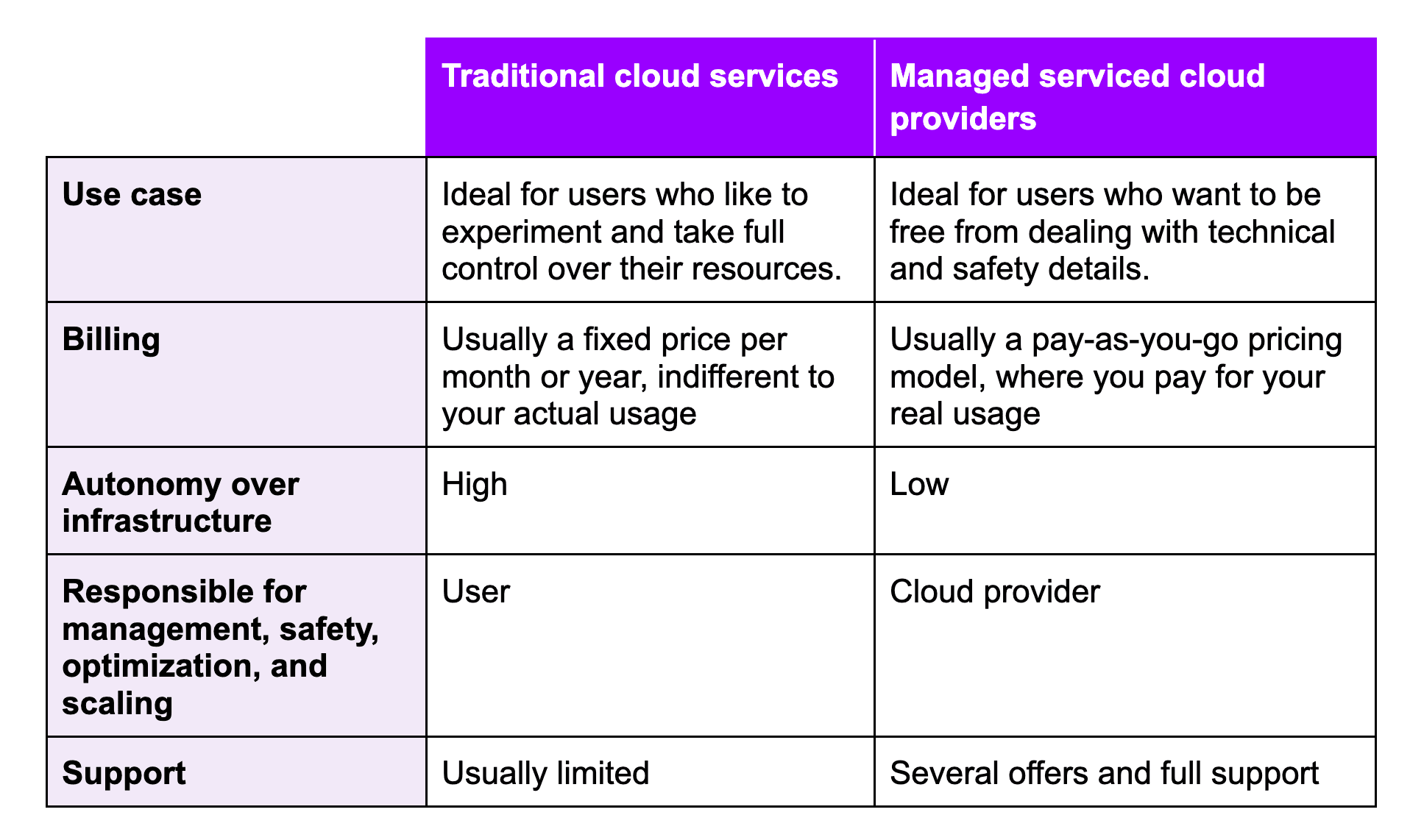What is a cloud service provider?

A cloud service provider (CSP) is a company that offers computing services on the internet, also known as the cloud. These services can be divided into three categories: Infrastructure as a Service (IaaS), Platform as a Service (PaaS), and Software as a Service (SaaS).
Amongst the products and services offered by cloud providers are virtual machines, storage, networking solutions, and applications, but the possibilities go way beyond that, and allow businesses to manage resources with no need to own or maintain physical hardware themselves. The variety of services enables scalability, cost efficiency, and security no matter what your needs are.
This blog post will walk you through the main characteristics of a cloud service provider, its benefits, tips to help you identify if you require one, and what to look out for when choosing between the available offers.
What is the difference between traditional cloud services and cloud MSPs?
Before diving into details, let’s take a look at the main differences between traditional cloud services and cloud managed services providers (MSPs):

As you can see, the choice will depend on your preferences and needs, as each model will contain different offers of control and access and require different levels of expertise from you.
Read on to learn more about the specificities of managed cloud service providers and their benefits for your business.
How managed cloud service providers can improve the performance and security of your business
We can think of managed cloud service providers (MSPs) as a third-party IT department of your business, offering you expert management, proactive monitoring, and tailored solutions. This means no longer having to deal with coming up with security and performance prevention strategies.
Cloud MSPs have a wide range of solutions to optimize your resource consumption, managing and monitoring potential threats and outages, all while keeping your data secure thanks to robust safety measures.
Shall we now look at the available cloud service models and their use cases?
The 3 different cloud service models
As we have said before, cloud services are commonly split into Infrastructure as a Service (IaaS), Platform as a Service (PaaS), and Software as a Service (SaaS). The main differences between them revolve around the level of control and the type of resources they provide:
Infrastructure as a Service (IaaS)
Provides virtualized computing resources such as servers, storage, networking, and virtual machines. This model saves time and money on physical hardware and allows for scalability and flexibility.
Level of control: maximum control over the infrastructure, meaning responsibility for managing the operating system, applications, updates, and maintenance.
Use cases: web hosting, building test and development environments, high-performance computing, and enterprise applications.
Platform as a Service (PaaS)
Here, your provider offers a development platform that includes hardware, operating systems, storage, and networking, as well as tools and frameworks to develop, test, and deploy applications.
Level of control: limited control over the infrastructure, but usually some access to application and configuration settings, especially related to the deployment environment.
Use cases: software creation, development of mobile or web applications, automation, and data analytics.
Software as a Service (SaaS)
SaaS provides fully developed software applications where your provider handles the entire infrastructure, platform, software, updates, security, and maintenance.
Level of control: very limited to no control over the infrastructure or platform, and you can typically customize only minor application settings.
Use cases: accessing applications like email servers, CRM tools, office suites, collaboration tools, and project management software.
The choice of model will depend on your needs and expectations, with IaaS offering a lot of flexibility, PaaS being ideal for simplifying app development, and SaaS providing fully functional software that requires little technical knowledge.
5 roles of cloud service providers
Before narrowing down your choices, you should know what are the roles and responsibilities of a cloud managed service provider:
1. Monitoring
Your cloud provider should offer continuous tracking and analysis of your services’ performance, health, and security, as proactive monitoring enables early identification of potential issues before they impact your operations.
2. Cost optimization
Look for providers that offer resources to help you efficiently manage and adjust consumption. Features like auto-scaling and budgeting tools make it easy to avoid unnecessary costs.
3. Security
It is your MSP’s role to help you stay protected from unauthorized access, cyber threats, and data breaches. They do so through encryption, firewalls, identity and access management (IAM), and other security features.
4. Backup
Data loss can severely impact operations, so choose a cloud provider with robust solutions to prevent and recover from such issues. Effective backup solutions include automated backups, redundancy across different geographic locations, and versioning.
5. Disaster recovery
Disaster recovery solutions allow you to minimize downtime and restore critical IT systems, applications, and data in case of hardware failures or cyberattacks, for example.
These five items have a major impact on the security and reliability of your cloud infrastructure. Take your time evaluating them and find a cloud provider who meets all the requirements for a smooth experience.
Now, why should you have a managed cloud service provider?
Whether you are a new business who can’t yet hire a dedicated IT team or want to dedicate less time to the technical aspects of your infrastructure, an MSP can offer you several immediate and long-term benefits:
Key advantages to using a cloud service provider
- Cloud expertise: Rely on your provider’s team of experts to handle your architecture, security, and management 24/7
- Cost optimization: Use resources efficiently with MSPs’ flexible pricing and pay-as-you-go model, adjusting resources to reflect your real needs and scaling them up as you grow.
- Security and compliance: Minimize the risk of intrusions and potential breaches, and comply with industry regulations
- Scalability: Adapt your infrastructure according to your demand, tailoring your services and expenses to your needs
- Proactive monitoring: Anticipate potential performance issues or threats and easily adjust your offer and usage to the current traffic, avoiding downtime and outages
- Disaster recovery: Have a clear plan to deal with disasters, ensuring your production is safeguarded.
These are only some advantages of partnering with a cloud MSP. With the right company, you can have expert cloud management, cost optimization, and enhanced security and regulatory compliance, all while reducing the complexity of managing a cloud infrastructure.
Scaleway, one of the safest cloud providers in Europe

Regarding safety, between compliance, certifications, and security features, Scaleway has everything you need to lead your business with tranquility.
Scaleway ensures that your data is stored in compliance with the General Data Protection Regulation (GDPR). We also help you keep your Organization secure with Identity and Access Management (IAM), which you can use to apply fine-grained role-based access controls to regulate access of internal or external collaborators.
For companies requiring more strict security, Scaleway is ISO/IEC 27001 and HDS certified, ensuring you are equipped with the highest possible standards for data handling.
The physical integrity of our data centers is also guaranteed thanks to several measures, such as 24/7 security staff presence, video surveillance systems, alarms, fire prevention, and other risk management initiatives.
Learn more about our safety measures, certifications, and compliance policies.
7 reasons to choose Scaleway as your cloud provider
You already know everything to look out for when choosing a cloud provider. Now, let us show you why Scaleway might be the ideal choice for you:
1. Compliance and sovereignty
As you’ve seen above, if data privacy and safety are your priorities, rest assured with Scaleway’s commitment to security up to the most demanding standards.
2. Transparent and competitive pricing
At Scaleway, clear and fair pricing is one of our biggest concerns. This is why we operate on a pay-as-you-go model, allowing you to predict expenses and control your budget.
3. Sustainability
With sustainability at heart, Scaleway has many environmental initiatives in place, such as data centers powered by renewable energy, low water consumption, and prolonged component usage.
4. Scalability and flexibility
Enjoy flexible options to scale your services up and down as you need, optimizing your costs and adapting your offer to changing demands.
5. Multi-cloud integration
Scaleway supports multi-cloud strategies for you to get the most out of each service with freedom and ease.
6. Solid product documentation
You can count on a complete product documentation with quickstart guides, how-tos, FAQs, tutorials, additional content, and more to guide you through each step of your Scaleway journey.
7. AI leadership
Scaleway has innovation at heart and is one of the biggest players in the artificial intelligence market. Not only does our product catalog offer the most recent releases, but we have created a dedicated event, AI Pulse, to push the industry boundaries.
In short, if you are looking for a provider who offers you transparent pricing, high performance, and scalability while remaining sustainable and compliant with privacy protection measures, Scaleway is the right choice for you.
After all, do you need a cloud service provider?
The short answer is that anyone could benefit from a cloud service provider. From small businesses to large enterprises, cloud services are versatile and can solve the most diverse needs.
For startups, being able to adjust resource usage and having access to flexible billing help keep their operations cost-efficient. Tech companies benefit from development and testing environments that speed up application delivery and e-commerce can keep a scalable cloud storage that simplifies data and inventory management and supports traffic spikes during peak seasons.
Industries with strict data requirements, such as healthcare, financial services, and the public sector, gain secure data storage and compliance support from cloud providers.
In conclusion
Cloud service providers can be part of a winning strategy for any company, no matter their size or field of activity. By partnering up with a serious company and establishing clear goals and needs, you can profit from their expertise to offload technical concerns and have more time and funds to keep growing your business.
In addition to more predictable and efficient costs, a cloud provider can help you easily scale your services, anticipate, prevent, and solve issues, and offer your customers the most recent technological innovations.